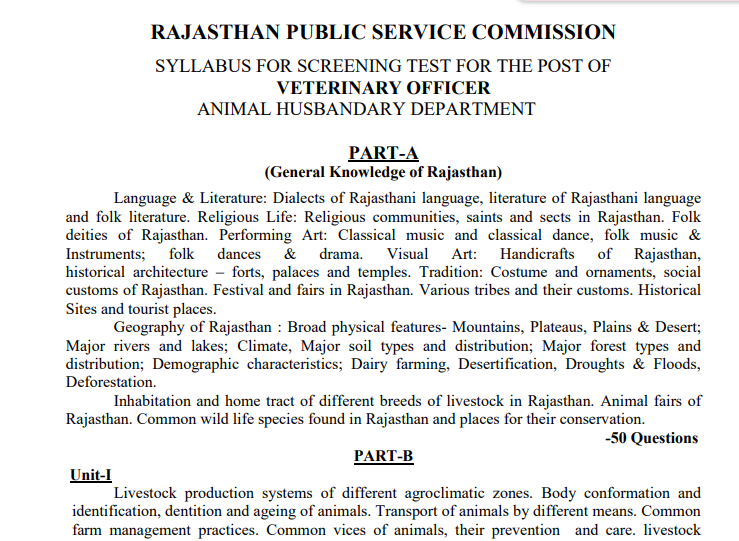Recently, the Rajasthan Public Service Commission (RPSC) released the official notification for the Veterinary Officer Recruitment 2025. This has opened a great opportunity for veterinary science graduates who are looking to secure a government job in Rajasthan.RPSC Veterinary Officer Syllabus
RPSC Veterinary Officer Syllabus 2025
To prepare effectively for this exam, it is important to understand the complete syllabus and the latest exam pattern. The RPSC Veterinary Officer syllabus includes subject-specific topics from veterinary science along with general knowledge related to Rajasthan. This guide will provide you with a clear breakdown of all the topics, a marking scheme, and helpful preparation tips to support your journey towards success.
The RPSC Veterinary Officer examination is a great opportunity for candidates who wish to work in Rajasthan’s animal husbandry and veterinary services. The 2025 recruitment cycle comes with updated guidelines and a more focused syllabus, designed to select candidates who have both strong subject knowledge and practical skills. Staying updated with the official syllabus is essential for smart preparation and better chances of success.
RPSC Veterinary Officer Exam Pattern 2025
Before going through the detailed syllabus, let’s first understand the updated exam pattern for the RPSC Veterinary Officer Exam 2025. This will give you a clear idea of the structure and help you plan your preparation more effectively:
| Section | Number of Questions | Marks | Duration |
|---|---|---|---|
| General Knowledge (Rajasthan) | 40 | 40 | |
| Veterinary Science | 80 | 80 | |
| Animal Husbandry | 50 | 50 | |
| Practical Skills (Interview)* | — | 20 | — |
| Total | 170+Interview | 170+20 | 2 Hours (Written) |
-
Question Type: Objective Multiple Choice Questions (MCQs)
-
Negative Marking: 1/3rd marks deducted for every wrong answer (as per latest guidelines)
-
Minimum Qualifying: 40% (may vary for reserved categories)
RPSC Veterinary Officer Recruitment 2025 Syllabus Breakdown
General Knowledge (GK) – Rajasthan Specific
This section examines your familiarity with Rajasthan. Focus areas include:
-
History, Art & Culture of Rajasthan
-
Geography & Environment of Rajasthan
-
Political & Administrative System
-
Economy of Rajasthan, Major Industries
-
Current Affairs: State Government Schemes & Initiatives
-
Rajasthan’s livestock resources and veterinary infrastructure
Veterinary Science
The core subject area, covering:
-
Anatomy & Physiology
-
Gross and microanatomy of domestic animals
-
Physiology of digestion, reproduction, lactation, blood, and circulation
-
-
Pathology & Parasitology
-
General pathology, etiology, and pathogenesis
-
Diagnostic procedures, zoonotic parasites, life cycles
-
-
Pharmacology
-
Drugs & chemicals in veterinary medicine
-
Dosage, vaccines, and diagnostic agents
-
-
Microbiology & Public Health
-
Major infectious diseases
-
Veterinary hygiene, sanitation, and waste management
-
-
Surgery & Radiology
-
Common surgical procedures
-
Anesthesia basics, principles of radiology and imaging
-
-
Veterinary Medicine
-
Diagnosis and control of major animal diseases
-
Epidemiology, emerging diseases
-
Animal Husbandry
Centres on management practices and economic aspects:
-
Livestock Production & Management
-
Breeds of cattle, buffalo, sheep, goat, and camel in Rajasthan
-
Dairy and poultry farming techniques and economics
-
-
Animal Nutrition
-
Principles of animal nutrition, feed resources
-
Feed formulation and supplementation
-
-
Genetics & Breeding
-
Basic genetics, selection, breeding techniques
-
Artificial insemination, reproductive management
-
-
Extension Services & Economics
-
Veterinary extension, communication, economics of animal husbandry
-
Government schemes, entrepreneurship in animal husbandry
-
Practical Skills Assessment
After qualifying the written test, candidates must clear the skills/interview round which assesses:
-
Clinical case interpretation
-
Animal handling and sample collection
-
Communication ability in extension activities
-
Awareness of field-level veterinary challenges
Important Topics & Weightage
While every topic is important, these areas historically have heavier weightage and can provide an edge:
-
Infectious diseases of livestock (Brucellosis, Foot & Mouth, etc.)
-
Disease prevention and control methods
-
Ruminant nutrition and common metabolic disorders
-
Major indigenous breeds and their characteristics in Rajasthan
-
Dairy management and animal reproduction
-
Government schemes for livestock development
RPSC Veterinary Officer Syllabus 2025 PDF Download
RPSC Veterinary Officer Syllabus
RPSC Veterinary Officer Preparation Tips & Study Plan
1. Start with the official syllabus: Never bypass the RPSC guidelines.
2. Make a topic-wise timetable: Allocate more time to high-weightage sections.
3. Practice with previous year question papers: This enhances speed and accuracy.
4. Take mock tests: Simulate real exam conditions to identify and rectify weaknesses.
5. Revise regularly: Make concise notes for last-minute revisions.
6. Focus on Rajasthan-specific GK: State government schemes and veterinary initiatives feature prominently.
7. Prepare for practical skills: Stay updated on current veterinary practices, especially those commonly used in Rajasthan.
The RPSC Veterinary Officer Syllabus 2025 is well-structured, covering both academic subjects and practical field knowledge. Candidates should prepare each section carefully, with special focus on Rajasthan-specific topics. Regular practice, revision, and a clear understanding of the exam pattern will play a key role in your success. With consistent effort and smart preparation based on the official syllabus, you can significantly improve your chances of being selected for this prestigious position.
Frequently Asked Questions
Q1: Is the syllabus updated for RPSC Veterinary Officer Exam 2025?
A: Yes, RPSC has updated certain subjects and enhanced the practical skills component in 2025. Always refer to the latest official notification.
Q2: Is there negative marking?
A: Yes, 1/3rd of marks allotted to each question will be deducted for every wrong answer.
Q3: What is the cutoff for selection?
A: Generally, it is 40%, but it can vary depending on category and vacancies.
Q4: What are the best books for preparation?
A: For core subjects, reference standard veterinary textbooks, RPSC-specific practice books, and Rajasthan GK guides.

